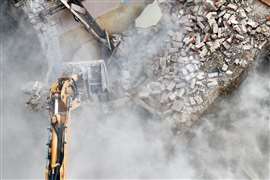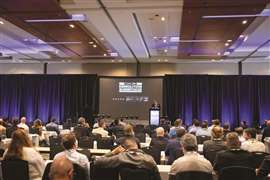Demolition and neighbours: How to avoid project shutdowns
07 October 2025
D&RI columnist Sarah Fox argues that it’s rarely the machines that stop a demolition project — it’s the neighbours.
 Photo: AdobeStock
Photo: AdobeStock
It wasn’t the crane or the concrete crusher that shut down the project. It was the neighbours. Or rather, the breakdown in trust with the neighbours.
The moment we forget that demolition work affects people beyond the hoarding, we risk everything – from claims to court orders to full project shutdowns.
How can you earn trust on a demolition site?
As Steven M.R. Covey says, trust is a combination of character and competence. It’s not about how many awards you’ve won or how glowing your testimonials are.
It’s about doing exactly what you said you would. Keeping your promises reflects both who you are and how good you are.
You can earn the trust of third parties (who have no direct control over the project) through:
- Keeping to agreed working hours and impact limits
- Communicating transparently with others such as on site noticeboards, hotlines or the now-ubiquitous QR code
- Honouring access agreements and impact assessments.
Neighbours expect demolition to be dusty, noisy and disruptive – they’re already ‘put out’. What you don’t want to do is ‘put their nose out’ by missing agreed targets.
Once complaints start, your name will be mud.
Key agreements every demolition contractor must manage
Before work starts, you’ll need to review any planning conditions relating to the site such as working hours, or maximum levels for noise, vibration and dust.
These constraints aren’t optional. They can be enforced by regulators and neighbours alike.
Your demolition contract might also refer to third-party agreements like funding agreements or agreements for leases.
These can create obligations for progress reports, inspections or compliance with external standards. If your demolition contract mentions them, read them.
If they’re missing, ask. These agreements are often the trigger for an indemnity – meaning you compensate the client dollar for dollar if your team slips up.
It’s better to know what’s required before you start, than to argue about what you missed (because you didn’t read it) later.
Neighbours may also be signatories to access arrangements or party wall agreements. These are not just another round of boring paperwork; they can be practical tools for keeping relationships intact. In many cases, neighbours have no financial interest in the site and may be opposed to both the demolition and the new project. So you need to work intentionally to build trust: open, proactive communication can go a long way to reinforcing your character and competence.
For some projects, it’s not just the immediate neighbours watching - the whole community is involved.
In Paris, the President intervened to stop the demolition of Marie Curie’s lab. In India, activists have rallied to protect Chandigarh’s Rock Garden.
Istanbul’s Gezi Park saw widespread demonstrations against demolition, and Bangkok’s Scala cinema was at the centre of a protracted preservation campaign.
These third-party pressures can delay projects for years and escalate costs - even when the developer ultimately prevails in court.
If your project is lucky enough to have a stakeholder engagement team, fantastic. If not, assign someone to listen, log, and respond. That person may be the difference between a successful handover and a legal standoff.
Common demolition mistakes that destroy trust
Back in 2008, demolition started on a site in London’s financial district. With all eyes on the project’s technical and commercial challenges, the legal risks were overlooked… until an adjacent insurance company filed for an injunction to which the court agreed. The demolition had:
- Exceeded vibration limits
- Caused water ingress to neighbouring basements
- Blocked access to neighbouring properties.
An injunction stopped all work for six months until it could be varied, by which time they were in the middle of an economic crisis. The financial and reputational impact was significant, and entirely preventable.
This kind of dispute isn’t unique to the UK. In Illinois, legal action was taken over incorrect asbestos removal during the demolition of a hotel. Across the globe, when trust is lost, courts step in.
Building (and rebuilding) trust
If you want to be the contractor they invite back – not the one they report –you’ll need to plan how you will build and keep trust.
Before works begin, you should:
- Obtain condition surveys
- Establish shared baselines and diagrams
- Use simple visual tools (flowcharts, timelines) to explain what third parties can expect
- Hold informal meetings with those affected to understand concerns and set expectations.
During the project, be sure to:
- Keep objective, dated records — photos, videos, site diaries, monitoring logs
- Use records not just as evidence, but as reassurance: shared responsibly, they can calm worries and show you’re in control
- Assign a named point of contact — ideally someone with emotional intelligence, not just technical fluency.
And when issues, almost inevitably, arise take them seriously. Respond promptly. Fix what you can. Even when you believe you’ve done everything ‘right’, it’s worth listening. My personal mantra: you can never say sorry too often… unless your insurance tells you not to.
Keep the faith
Trust isn’t built by legal contracts or insurance policies. It’s built by competent project teams doing what they said they’d do, when they said they’d do it, and being accountable when they don’t.
Demolition doesn’t happen in a vacuum: it happens on someone’s doorstep. Let’s keep that doorstep clean.
About the author

Based in the UK, Sarah Fox is a contract expert with over 30 years’ experience in the construction and engineering sectors.
A former lawyer, she works with both UK and international clients and is an associate lecturer at the University of Salford.
Sarah specialises in creating concise, user-friendly contracts that promote clarity and reduce disputes. She is also the author of several books on construction law, including the ground-breaking industry title Small Works Contracts in Just 500 Words.
CONNECT WITH THE TEAM









